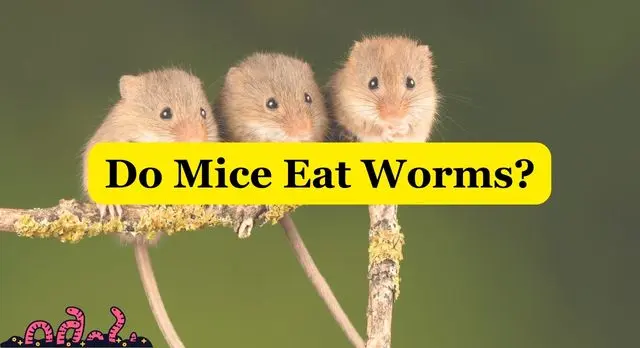Do Mice Eat Worms? Unveiling the Surprising Eating Habits of Mice
Mice, those tiny creatures scurrying through our homes and fields, have long been regarded as opportunistic omnivores. Their ability to adapt to various environments and food sources is remarkable. However, when it comes to their diet, there are often questions surrounding what they consume. One such query that frequently arises is, “Do mice eat worms?” In this article, we will delve into the dietary habits of mice and uncover whether these small rodents include worms as part of their menu.

Do Mice Eat Worms?
Mice are opportunistic eaters, meaning they will consume whatever food is available to them. While they primarily feed on plant material, they are not strictly herbivorous. Mice are omnivores, which means their diet includes both plant and animal matter. This versatility allows them to adapt to different environments and food sources.
When it comes to worms, mice like to eat worms, although worms are not a staple part of their diet. Mice are known to be opportunistic hunters, and they will seize the opportunity to catch and consume worms when they come across them. However, worms do not make up a significant portion of their diet compared to other food sources.
Factors Influencing a Mouse’s Worm Consumption
Several factors play a role in determining whether mice will eat worms. Let’s take a closer look at these factors:
- Availability: The presence of worms in a mouse’s environment significantly impacts their consumption. Mice are more likely to eat worms if they are abundant and easily accessible.
- Habitat: Mice that reside in outdoor environments, such as fields or gardens, are more likely to encounter worms and include them in their diet.
- Seasonal Variation: Worm availability can fluctuate depending on the season. During wetter periods, worms are more abundant, increasing the likelihood of mice incorporating them into their diet.
- Alternative Food Sources: Mice will primarily rely on their preferred food sources, such as grains and seeds. If these options are scarce, they may turn to worms as a supplementary food source.
- Predatory Nature: Mice are natural predators, and their opportunistic eating habits extend to small insects and worms. When presented with the opportunity, mice will seize it.
Benefits and Risks of Worm Consumption for Mice
While worms can serve as an additional food source for mice, there are both benefits and risks associated with their consumption:
Benefits:
Nutritional Content: Worms are rich in protein, which is essential for a mouse’s growth, reproduction, and overall health.
Dietary Diversity: Including worms in their diet allows mice to obtain a broader range of nutrients.
Energy Source: Worms can provide an additional energy source, especially during times when other food options are limited.
Risks:
Parasitic Infections: Consuming worms can expose mice to various parasites, including nematodes and flatworms.
Contamination: Worms found in polluted environments may contain harmful substances that can negatively affect a mouse’s health.
Key Takeaway
In conclusion, while mice are not exclusive worm-eaters, they do include worms as part of their diet under certain circumstances. Factors such as worm availability, habitat, seasonal variation, and alternative food sources influence a mouse’s decision to consume worms. Worm consumption offers nutritional benefits to mice, including protein and dietary diversity. However, it also carries risks such as potential parasitic infections and contamination from polluted environments. Understanding the dietary habits of mice, including their consumption of worms, helps shed light on their behavior and adaptability as curious predators in our surroundings.
FAQs
Do mice eat earthworms?
Yes, mice can eat earthworms. Although earthworms may not be a primary part of a mouse’s diet, they are opportunistic eaters and will consume worms if they are available and accessible in their environment.
Do wild mice eat worms?
Yes, wild mice do eat worms. Wild mice, just like their domestic counterparts, are opportunistic eaters and will include worms in their diet if they come across them in their natural habitats, such as fields, gardens, or forested areas.
Do mice eat mealworms?
Yes, mice can eat mealworms. Mealworms are a common food source for many small animals, including mice. They are often used as a supplementary food for pet mice or as bait for trapping wild mice.
Do field mice eat worms?
Field mice, which are a type of wild mouse, do eat worms. These mice are adapted to live in outdoor environments, including fields and meadows, where they have access to various food sources, including worms. Worms can be a part of their diet depending on their availability in the field ecosystem.
